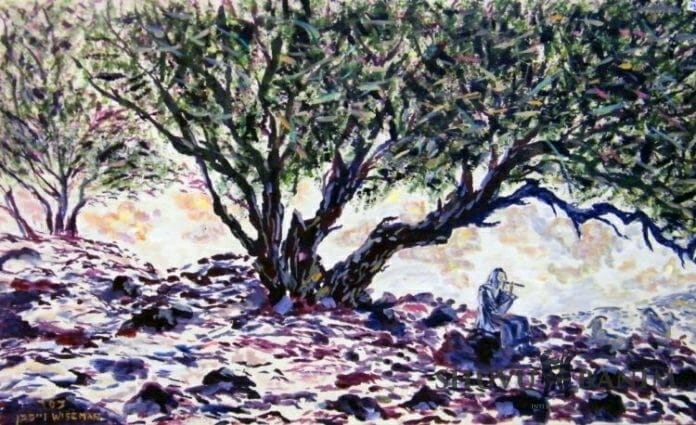“And you will be like G-d” (Bereshis 3:5)
The sin of the Tree of Knowledge is “and you will be like G-d.” A person thinks that he’s already G-d, the world is in his hands, he controls the world.
Why is a person sick? Why doesn’t he have children? Livelihood? He doesn’t find his soul mate? It’s all because of ga’ava (pride). Every thought of ga’ava destroys his spiritual and physical influx. Every thought of ga’ava pushes away the legs of the Divine presence, as is written, “He and I can’t dwell in the same place.” Because of a thought of ga’ava, the Divine presence withdraws from a person more than from any other transgression. Sometimes a person stumbles in a transgression — then he’s broken…he does teshuva. But a person who is found in ga’ava has no broken heart at all, because ga’ava is the opposite of a broken heart. Therefore, he doesn’t do teshuva.
When a person is in ga’ava, he can’t stand any person in the world. He thinks, “Who can get to me?” “Who is worthwhile for me?” A person goes around with the thought that he’s the smartest, the most discerning, the cleverest.
If a person feels that he does something: “I prayed with kavanah (concentration), I screamed in prayer, I got up [to pray] at dawn,” and thinks to himself, “I’m better than this person who’s sleeping in his bed right now,” then everything gets lost. This person who’s lying in bed now, perhaps he’s a weak person? Maybe he’s praying now with a tallis and shedding rivers of tears? What do you know? True, he got up at 8 and said Kriyas Shema, but afterwards he cries for a full hour. What does a person know? The moment that you have a thought of ga’ava from having risen at dawn or acted with ascetism… you have a particular behavior, and therefore you’re already better than the other person — at that moment, everything goes to the Sitra Achra unless a person identifies his ga’ava and does teshuva for every thought of ga’ava. Then he rectifies everything and raises everything to holiness.
A person needs to know one principle: That ga’ava and ta’ava (lust) are not relevant to a Jew. This isn’t the essence of a Jew. This is only an external dressing, because the moment that Adam HaRishon sinned, the holy Zohar says, he received a dressing called “Tza’aras, the skin of the serpent.”
Hashem gave him the punishment of receiving the skin of the serpent, which is called, “garments of skin” (‘OR’ with an Ayin), and not “garments of light” (‘OR’ with an Alef), like it was at the beginning. Therefore, every person at the moment that he’s born receives this external garment — “Tza’aras, the skin of the serpent” which is ga’ava and ta’ava, and needs to fight this and know that “this isn’t me.” “This isn’t me that desires.” “This isn’t my true desire.” A person thinks that lust is his true desire, his essence. This isn’t true, it only appears to him so. Some kind of physical desire, some foreign desire, became attached to him. This isn’t the nature of a person. This comes from the sin of the Tree of Knowledge. When Adam HaRishon ate from the Tree of Knowledge, there was a particular type of poison there. He ate this poison and poisoned all of humanity, but we need to escape from this poison. It’s forbidden to become addicted to this poison, it’s forbidden to allow this poison to draw us along. A person needs to shed his serpent body, his serpent skin, because his body is essentially the body of the Samech-Mem. Hashem created for him garments of skin, garments of the Samech-Mem (the ga’ava and ta’ava). And really, the true Tzadikim merited to nullify this serpent body through their holy service.
Therefore, Rabbeinu says (Likutey Moharan 10), that the advice for nullifying the ga’ava is closeness to Tzadikim, because the moment that a person draws close to the true Tzadik, he immediately sees where he’s holding in rectifying his traits, and begins to hate his evil [side], to hate his ta’ava. He doesn’t want it any more.
At the very least, he won’t make out of his ta’ava a “way of life.” He will be embarrassed, cry over this, and do teshuva. And not like those people who make out of their ta’ava “a way of life” instead of being embarrassed by it. The opposite, they take pride in it, ascribe importance to it. If people would believe in Tzadikim and draw close to them and heed their voice, then they would merit to escape from all their evil, and from all the ta’avos, and be completely purified.













